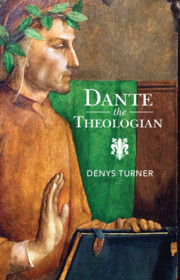102 results
2 - Hell
- from Part I - Hell
-
- Book:
- Dante the Theologian
- Published online:
- 02 September 2022
- Print publication:
- 22 September 2022, pp 41-78
-
- Chapter
- Export citation
Acknowledgments
-
- Book:
- Dante the Theologian
- Published online:
- 02 September 2022
- Print publication:
- 22 September 2022, pp xvi-xx
-
- Chapter
- Export citation
Contents
-
- Book:
- Dante the Theologian
- Published online:
- 02 September 2022
- Print publication:
- 22 September 2022, pp ix-x
-
- Chapter
- Export citation
6 - Paradise and Paideia
- from Part III - Paradise
-
- Book:
- Dante the Theologian
- Published online:
- 02 September 2022
- Print publication:
- 22 September 2022, pp 201-242
-
- Chapter
- Export citation
Index
-
- Book:
- Dante the Theologian
- Published online:
- 02 September 2022
- Print publication:
- 22 September 2022, pp 295-299
-
- Chapter
- Export citation
4 - Purgatory and Purgation
- from Part II - Purgatory
-
- Book:
- Dante the Theologian
- Published online:
- 02 September 2022
- Print publication:
- 22 September 2022, pp 117-158
-
- Chapter
- Export citation
Copyright page
-
- Book:
- Dante the Theologian
- Published online:
- 02 September 2022
- Print publication:
- 22 September 2022, pp vi-vi
-
- Chapter
- Export citation
3 - Inferno as Anti-narrative
- from Part I - Hell
-
- Book:
- Dante the Theologian
- Published online:
- 02 September 2022
- Print publication:
- 22 September 2022, pp 79-114
-
- Chapter
- Export citation
Dedication
-
- Book:
- Dante the Theologian
- Published online:
- 02 September 2022
- Print publication:
- 22 September 2022, pp vii-vii
-
- Chapter
- Export citation
Part II - Purgatory
-
- Book:
- Dante the Theologian
- Published online:
- 02 September 2022
- Print publication:
- 22 September 2022, pp 115-198
-
- Chapter
- Export citation
Part I - Hell
-
- Book:
- Dante the Theologian
- Published online:
- 02 September 2022
- Print publication:
- 22 September 2022, pp 39-114
-
- Chapter
- Export citation
Epigraph
-
- Book:
- Dante the Theologian
- Published online:
- 02 September 2022
- Print publication:
- 22 September 2022, pp viii-viii
-
- Chapter
- Export citation
Reviews
-
- Book:
- Dante the Theologian
- Published online:
- 02 September 2022
- Print publication:
- 22 September 2022, pp ii-iv
-
- Chapter
- Export citation
Part III - Paradise
-
- Book:
- Dante the Theologian
- Published online:
- 02 September 2022
- Print publication:
- 22 September 2022, pp 199-289
-
- Chapter
- Export citation
Select Bibliography
-
- Book:
- Dante the Theologian
- Published online:
- 02 September 2022
- Print publication:
- 22 September 2022, pp 290-294
-
- Chapter
- Export citation
5 - Hope, Memory, and the Earthly Paradise
- from Part II - Purgatory
-
- Book:
- Dante the Theologian
- Published online:
- 02 September 2022
- Print publication:
- 22 September 2022, pp 159-198
-
- Chapter
- Export citation
7 - Paradise and the End of Poetry
- from Part III - Paradise
-
- Book:
- Dante the Theologian
- Published online:
- 02 September 2022
- Print publication:
- 22 September 2022, pp 243-289
-
- Chapter
- Export citation
1 - Theology and Poetry
-
- Book:
- Dante the Theologian
- Published online:
- 02 September 2022
- Print publication:
- 22 September 2022, pp 1-38
-
- Chapter
- Export citation
Preface
-
- Book:
- Dante the Theologian
- Published online:
- 02 September 2022
- Print publication:
- 22 September 2022, pp xi-xv
-
- Chapter
- Export citation

Dante the Theologian
-
- Published online:
- 02 September 2022
- Print publication:
- 22 September 2022



